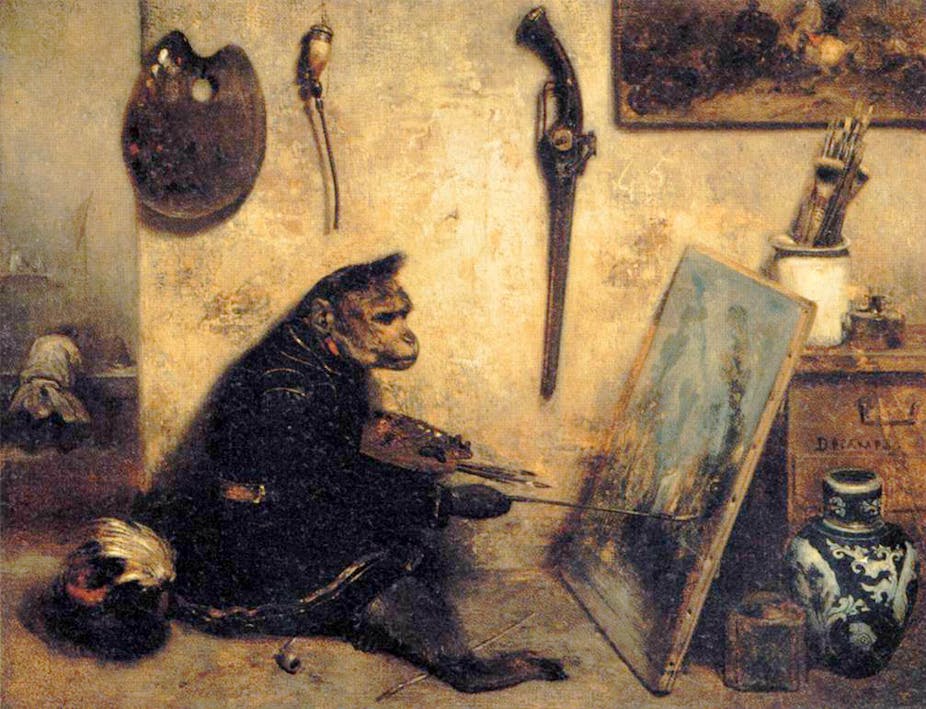In Kubrick’s masterpiece, 2001: A Space Odyssey, a group of our ape-like ancestors encounter a towering black rectangle somewhere in an African desert. Something in them changes. A seed is sown. Everything from tool use to space travel is now inevitable.
Human beings have always felt that we are fundamentally different from other animals. We have done countless things that no other species could do. We have reshaped the world around us. But anyone who has spent time with animals can see that we also have much in common.
Defining exactly what separates us from other animals has proven surprisingly difficult. Large brains, tool use and language may each seem like attractive answers, but each turns out to be less clear-cut. Maybe the most notable thing about humanity is that we are able to communicate ideas well enough for each generation to maintain and build upon the understanding of the previous one, giving us a cumulative culture like no other.
That still leaves open the question of what gives us this potential. Ruling out an intervention by Space Odyssey’s monoliths, was there a single trigger that kickstarted the human revolution?
Undoubtedly genetic mutation played a part. But did those mutations occur before the revolution started or after? In a paper published in Science today, Simon Fisher at Max Planck Institute for Psycholinguistic, Netherlands and Matt Ridley, formerly a science journalist, try to answer the question.

Genes before beans?
We share 99% of our DNA with our closest living relative, the chimpanzee. So any genetic component of being human must be found in the differences between the two. Recent advances in technology mean that DNA sequences from some of our most recent extinct relatives are also becoming available to us, allowing a finer understanding of who evolved what, and when.
The best known mutations are those that change the sequence of a gene, which in turn changes properties of proteins made by that gene. We now know that a surprising amount of key variations are caused by mutations that leave the protein sequence unchanged, but alter the amount or the situations in which a protein is made. The relationships between genes and proteins form complex networks, in which an apparently small change in the DNA can lead to many changes in the proteins produced and therefore profound changes in the nature of the organism. In this way, a relatively few changes can lead to big differences in, say, brain size and structure.
But the brain is shaped by both genes and experience, and that makes it hard to be sure which came first. Questions of genetic and behavioural evolution sometimes put scientists in a chicken or egg situation.
What came first
If a genetic mutation and a behavioural change appear to be associated, scientists can be tempted to assume that the genetic mutation caused the change. But Fisher and Ridley argue that it is also worth considering that a change in lifestyle could suddenly make a particular mutation advantageous, and therefore allow it to spread throughout the population via natural selection. For example, a bigger brain is advantageous only if the body has enough resources to support it. It is possible that the mutations that caused the increase in brain size in humans happened only after the behavioural revolution of cooking, which made the nutrients in food more accessible.
Sometimes it is even possible to identify genes that may have had specific roles in the evolution of specific behaviour. For example, the FOXP2 gene is believed to be involved in language. Modern individuals who have faulty copies of this gene have difficulty speaking and understanding language. FOXP2 is also the gene whose sequence has the most differences between chimps and humans, and it is likely that between modern humans and Neanderthals the amount of FOXP2 protein made varies.

It is important, however, not to assume that this is the origin of language. In many animals, versions of the gene exist and they have roles in vocal and motor skills. It is likely that the evolution of FOXP2 gene honed such pre-existing skills. Such changes would be most advantageous to humans when some level of language was already being practised.
Examples of genetic changes following behavioural ones have previously been observed, but it is not always given due consideration. Much later in our evolution, after farming had developed, evidence shows that humans developed an increased ability to tolerate lactose (a key component of milk) only after they began consuming it. More recently, Europeans developed higher tolerance for alcohol relative to Asians because of their greater alcohol consumption.
Being human
So there are many things that separate modern humans from chimps and fewer that separate us from our closer extinct relatives. These include genetic, physical, behavioural and cultural differences, and they came into being over time, causing each other or allowing each other to become advantageous. This doesn’t imply that the transition was smooth. Successful populations may exist for long periods relatively unchanged, while one change can quickly trigger a cascade of changes.
It does, however, make it difficult to say that any specific change turned an ape into a human. A definitive answer to what made us “human” requires you to decide quite arbitrarily on a definition of human, and in doing that, you have probably answered your own question.

